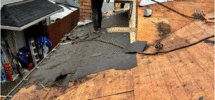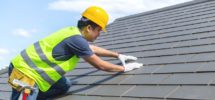 Flat roofs are a popular choice for commercial buildings in New Jersey, thanks to their affordability, efficient use of space, and ease of maintenance. However, commercial flat roof installation NJ requires careful planning and execution to ensure durability and performance. If you’re considering a flat roof for your business property, here are some key considerations to keep in mind.
Flat roofs are a popular choice for commercial buildings in New Jersey, thanks to their affordability, efficient use of space, and ease of maintenance. However, commercial flat roof installation NJ requires careful planning and execution to ensure durability and performance. If you’re considering a flat roof for your business property, here are some key considerations to keep in mind.
1. Understanding Building Codes and Regulations
New Jersey has specific building codes and regulations that govern commercial roofing projects. Before beginning your flat roof installation, ensure your project complies with local zoning laws, fire codes, and energy efficiency requirements. Working with a licensed roofing contractor familiar with NJ regulations can help you navigate these complexities and avoid potential legal or financial penalties.
2. Choosing the Right Roofing Material
Selecting the appropriate material for your flat roof is crucial. Common materials used for commercial flat roofs include:
- EPDM (Ethylene Propylene Diene Monomer): Known for its durability and resistance to UV rays and weathering, EPDM is a cost-effective choice for flat roofs.
- TPO (Thermoplastic Polyolefin): A lightweight and reflective material, TPO offers excellent energy efficiency and is resistant to punctures and tears.
- PVC (Polyvinyl Chloride): Ideal for roofs exposed to chemicals or grease, PVC is durable and offers superior weather resistance.
- Modified Bitumen: A reliable option that combines traditional asphalt with modern reinforcements, providing enhanced strength and flexibility.
Consider factors such as climate, building usage, and budget when selecting the material for your flat roof.
3. Proper Drainage Design
Flat roofs are not entirely flat; they have a slight slope to facilitate drainage. Ensuring effective drainage is critical to prevent water pooling, which can lead to leaks and structural damage. Options for flat roof drainage include:
- Internal Drains: Positioned strategically to channel water into the building’s drainage system.
- Scuppers: Openings at the edge of the roof that direct water away from the building.
- Gutters: Installed along the roof’s edges to collect and redirect water.
Work with your roofing contractor to design a drainage system that suits your building’s specific needs.
4. Energy Efficiency and Insulation
Energy efficiency is a top priority for many commercial property owners. Installing proper insulation and reflective roofing materials can significantly reduce heating and cooling costs. Options like TPO and PVC roofing membranes reflect sunlight, reducing the urban heat island effect and lowering indoor temperatures. Additionally, consider installing high-quality insulation to maintain consistent indoor temperatures and enhance overall energy efficiency.
5. Weather and Climate Considerations
New Jersey experiences a range of weather conditions, from hot summers to cold winters, as well as occasional storms and heavy rainfall. Choose a roofing material that can withstand temperature fluctuations and resist damage from high winds and precipitation. A flat roof snow ice removal NJ is particularly important during the winter months to prevent structural damage and leaks. Proper installation techniques and high-quality materials are essential for ensuring your roof’s longevity in NJ’s varied climate.
6. Maintenance Requirements
Flat roofs require regular maintenance to ensure optimal performance and longevity. Schedule periodic inspections to check for signs of wear, damage, or water pooling. Promptly address any issues to prevent minor problems from escalating into costly repairs. Discuss a maintenance plan with your contractor to keep your flat roof in excellent condition.
7. Contractor Expertise and Experience
The quality of your flat roof installation NJ depends largely on the expertise of your roofing contractor. Look for a contractor with experience in commercial flat roofing projects and a proven track record of success. Verify their licensing, insurance, and references before hiring. A skilled contractor will ensure proper installation, adherence to local regulations, and the use of high-quality materials.
8. Budget Planning and Cost Management
Flat roof installation is a significant investment, so it’s essential to plan your budget carefully. Obtain detailed quotes from multiple contractors and compare their offerings. Keep in mind that the cheapest option may not always be the best; prioritize quality and durability to avoid costly repairs or replacements in the future. Factor in additional costs such as insulation, drainage systems, and maintenance when calculating your budget.
9. Sustainability and Environmental Impact
Sustainability is becoming increasingly important for businesses. Consider eco-friendly roofing materials and practices for your flat roof installation. Options like TPO and PVC are energy-efficient and recyclable. Additionally, you can explore green roofing solutions, such as installing a vegetative roof, to enhance your building’s sustainability while providing insulation and reducing stormwater runoff.
10. Warranty and Insurance Coverage
Ensure your flat roof installation is backed by a solid warranty that covers both materials and workmanship. Review the warranty terms carefully to understand what is included and for how long. Additionally, verify that your contractor has adequate insurance coverage to protect against potential damages or liabilities during the installation process.
Conclusion
Installing a commercial flat roof in New Jersey is a strategic investment that requires careful planning and consideration. By understanding local regulations, choosing the right materials, and working with experienced professionals, you can ensure a durable, efficient, and cost-effective roofing solution for your business. Keep these key considerations in mind to make informed decisions and enjoy the long-term benefits of a high-quality flat roof.


